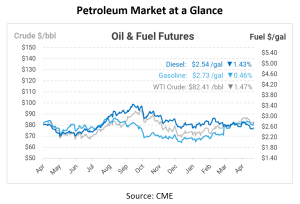
Is Fleet Electrification Over Your Budget? Renewable Fuels Could Be Your Answer
In today’s business landscape, there’s a growing push for companies to shrink their carbon footprint and adopt eco-friendly practices, with Electric Vehicles (EVs) playing a significant role in the conversation. However, Fleet electrification may not be as simple or cost-effective as it may seem on the surface. While genuine benefits exist, several often-overlooked costs are associated with this shift. For instance, electric trucks tend to be pricier, even with subsidies, have shorter road ranges and less off-road capability, and demand major infrastructure adjustments. Plus, the return on investment remains uncertain.
In a Government Fleet article, fleet managers shed light on the complexities and expenses of transitioning to EVs. Responding to a report by the Arizona Public Interest Research Group Education Fund and Frontier Group, fleet managers emphasized that the process goes beyond merely purchasing vehicles and installing charging infrastructure.
In today’s article, we’ll explore a breakdown of some costs associated with transitioning to EVs and reflect on alternative fuels – such as renewable diesel and biodiesel, and how they can be an affordable solution to help fleet managers reduce emissions and stay compliant with current and upcoming legislation.
EV Transition Costs
According to the Government Fleet article, one of the main challenges in fleet electrification is the need for significant facility modifications to comply with safety regulations. These modifications, including building extensions or entirely new facilities, aim to ensure worker safety and meet Occupational Safety and Health Administration (OSHA) requirements. Additionally, stringent safety protocols for storing EV batteries necessitate layout changes, resulting in a loss of work bays and decreased operational efficiency.
Moreover, creating quarantine locations for damaged EVs adds another layer of complexity and cost to fleet management. These locations require ample space to prevent potential fire hazards, further impacting operational logistics.
The expenses don’t end on infrastructure costs. Vehicle recalls, often related to software issues, can lead to substantial downtime. Also, contrary to popular belief, electricity as a fuel can be more expensive than anticipated, especially during peak demand periods.
Acquisition costs for EVs vary significantly across vehicle classes, with medium- and heavy-duty trucks being the most expensive. Additionally, ongoing maintenance costs for charging stations, mechanic training expenses, and the need for specialized equipment further strain budgets. Even collision repair costs for EVs are significantly higher than those for traditional vehicles, with insurance companies more inclined to declare EVs as total losses due to battery damage.
Zero Emission Vehicles?
The term “zero-emission vehicles” is often used to describe electric vehicles, but this label can be misleading as it only refers to zero tailpipe emissions and not to the emissions across the vehicle’s entire lifecycle. When evaluating the environmental impact of EVs, it is crucial to consider the carbon intensity (CI) of the electricity used to charge them. For example, the California grid, which powers many of these vehicles, has a CI score of 80.55, which is about twice as high as that of renewable diesel (RD). This contrast underscores that while EVs eliminate local tailpipe pollutants, their overall environmental impact is significantly influenced by the methods used to generate the electricity they consume. Therefore, their environmental benefits depend on how cleanly the electricity that charges them is generated.
Alternative Fuels
On the other hand, cleaner fuel alternatives present a straightforward solution for meeting commitments without compromise. For fleets not yet ready for EV transition but aiming for sustainability, biofuels offer seamless carbon footprint reduction and regulatory compliance while maintaining performance and efficiency.
Renewable Diesel and Biodiesel stand as practical solutions for the present. Their availability and compatibility with existing infrastructure make renewable fuels a to-go solution for businesses looking to bridge the gap between current operations, future legislation, and sustainability goals.
Renewable Diesel – Renewable Diesel (RD) stands at the forefront of sustainable fuel solutions, offering efficiency and performance. RD is a clean fuel made from waste fats, oils and greases, such as animal fats, used cooking oil, or soybean oil, and is processed to be chemically the same as petroleum diesel. With a higher cetane rating than traditional diesel, it ensures a cleaner and more efficient combustion, resulting in smoother engine operation and significantly reduced CO2 emissions —by up to 70%. Furthermore, its enhanced stability extends service intervals, leading to cost savings and improved business reliability.
Renewable Diesel allows seamless integration into existing engines, eliminating the need for costly conversions. Boasting over 3 billion gallons produced annually in the US, its availability is set to double by 2026.
Biodiesel - In addition to Renewable Diesel, Biodiesel is another efficient, sustainable option. Also derived from renewable biomass sources such as vegetable oils or animal fats, it offers substantial reductions in lifecycle CO2 emissions—up to 70%—and is a great lubricant, complementing traditional diesel or renewable diesel as a blend component.
The Uncompromising Path Forward
Embracing Renewable fuels isn’t just an eco-friendly plan — it’s a strategic move. In a world where environmental discussions are in the spotlight, cleaner fuel alternatives offer a tangible means of delivering on promises without compromise.
With deep expertise and a commitment to sustainability, Mansfield is equipped to assist your company in achieving compliance, managing fuel costs, and strategizing for the long term.
Mansfield can help you develop and execute a low-carbon fuel strategy that meets your needs and gets you to your destination. Contact our team of sustainability experts to learn more about our energy solutions.

This article is part of Daily Market News & Insights
Tagged:
MARKET CONDITION REPORT - DISCLAIMER
The information contained herein is derived from sources believed to be reliable; however, this information is not guaranteed as to its accuracy or completeness. Furthermore, no responsibility is assumed for use of this material and no express or implied warranties or guarantees are made. This material and any view or comment expressed herein are provided for informational purposes only and should not be construed in any way as an inducement or recommendation to buy or sell products, commodity futures or options contracts.





